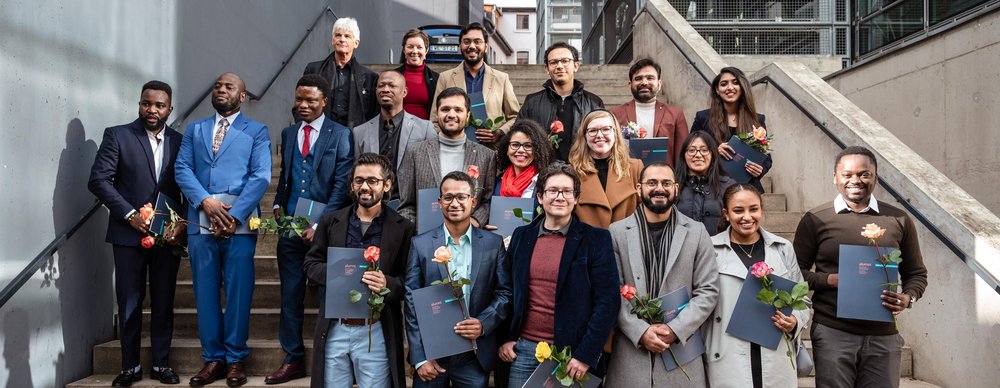About us


The Master's degree programme NHRE (Natural Hazards and Risks in Structural Engineering) is dedicated to the challenge of protecting engineering structures against the effects of extreme natural hazards. The focus is on teaching skills to analyse hazards, develop engineering responses to control risks and use these responsibly. Graduates learn to critically assess the effects of human behaviour and of science and technology, particularly with regard to sustainability and resource consumption. The programme emphasises the key role of civil engineering in the mitigation of natural disasters and continuously explores current methods to assess and reduce the vulnerability of built environments. As part of AGEP, NHRE also facilitates interdisciplinary networking with other international degree programmes to promote a comprehensive exchange and broader perspectives with regard to achieving the Sustainable Development Goals (SDGs).
| 2009/10 | Start of the Master's programme »Natural Hazards and Risks in Structural Engineering (NHRE)«, funding for scholarships as part of the DAAD EPOS programme |
|---|---|
| 2014 | Membership of the Master's programme "Natural Hazards and Risks in Structural Engineering (NHRE)" in the AGEP association |
| 2016 | Successful reapplication for DAAD-EPOS funding for the degree programme »Natural Hazards and Risks in Structural Engineering (NHRE)« |
| 2017 | Reaccreditation of the Master's programme »Natural Hazards and Risks in Structural Engineering (NHRE)« |
| 2023 | Reaccreditation of the Master's programme »Natural Hazards and Risks in Structural Engineering (NHRE)« |
| 2023 | Successful reapplication for DAAD-EPOS funding for the degree programme »Natural Hazards and Risks in Structural Engineering (NHRE)« |
Our programme »Natural Hazards and Risks in Structural Engineering« is member of the Association of Postgraduate Programmes with Special Relevance to Developing Countries (AGEP) since 2014.
The AGEP (Working group of postgraduate study programmes with special relevance for developing countries) is an association of over 50 German postgraduate degree programmes in the fields of natural sciences, engineering, regional, environmental and agricultural sciences, social sciences, economics and human medicine. What unites these programmes is their common mission to promote sustainable development in the participants' home countries and to train students to become change agents in line with the Sustainable Development Goals (SDGs).
Through the DAAD (German Academic Exchange Service), selected participants from developing countries are offered scholarships for these programmes. This opportunity enables them to participate in high-quality research projects, benefit from the research infrastructure, expertise and resources of German universities and research institutions and promote intercultural exchange and collaboration between researchers from different countries. This can lead to a deeper understanding of global research issues.
After graduating, former programme participants often work in international networks to overcome country- or region-specific challenges. The aim of the EPOS programme and the AGEP network programmes is to improve the career prospects of graduates and enable them to initiate and support development processes in their home countries more effectively.
Ziel des Masterstudiengangs NHRE ist der Abschluss mit dem »Master of Science« im Bereich Naturgefahren und deren Auswirkungen auf Ingenieurbauwerke. Der Studiengang vermittelt eine solide technische Basis Kenntnisse im konstruktiven Ingenieurbau und konzentriert sich auf ingenieurmäßige Lösungen zur Risikobeherrschung und -minderung bei Naturgefahren.
Angesichts der globalen Relevanz des Themas – verstärkt durch den Klimawandel – liegt ein besonderer Fokus auf der Qualifikation von Ingenieur*innen aus Entwicklungsländern, um sie auf verantwortungsvolle Aufgaben in ihren Heimatländern vorzubereiten. Besonders willkommen sind leistungsstarke weibliche Bewerber. Der Aufbau von Kooperationen mit internationalen Alumni und Fachbereichen an der Bauhaus-Universität Weimar ist ein weiteres zentrales Anliegen des Programms.
Der Studiengang trägt zur Erreichung mehrerer UN-Nachhaltigkeitsziele (SDGs) bei, indem er inklusive Bildung fördert, Frauen stärkt, widerstandsfähige Infrastrukturen unterstützt, Klimaschutzmaßnahmen entwickelt und globale Partnerschaften aufbaut (Ziele 4, 5, 10, 11, 17).
Besondere Merkmale:
Changes from color to monochrome mode
contrast active
contrast not active
Changes the background color from white to black
Darkmode active
Darkmode not active
Elements in focus are visually enhanced by an black underlay, while the font is whitened
Feedback active
Feedback not active
Halts animations on the page
Animations active
Animations not active